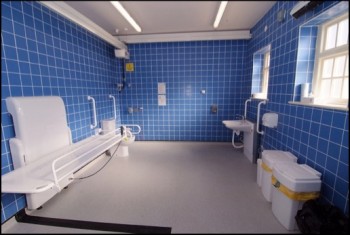New, or majorly refurbished, large buildings used by the public must have Changing Places toilets for severely disabled people, under government proposals announced over the weekend.
The proposals are expected to add the toilets to more than 150 new buildings a year, including shopping centres, supermarkets, cinemas, stadiums and arts venues.
Changing Places toilets are larger accessible toilets for severely disabled people, with equipment such as hoists, curtains, adult-sized changing benches and enough space for carers.
There are over 1,300 Changing Places toilets in the UK, up from just 140 in 2007, but more are needed to support the more than a quarter of a million people who need them in the UK.
Without access to these toilets, it can be challenging for people to enjoy daily activities.

Local Government Minister, Rishi Sunak MP, said “Everyone should have the freedom to enjoy days out in dignity and comfort. For severely disabled people, this is made very difficult because there are not enough Changing Places toilets.
“We’ve made some progress, but I’m determined to increase the number of these life-enhancing facilities, so people are given the dignity they deserve.
“I’m pleased so many people will be helped by this major change.”
Catherine Woodhead, Chief Executive of Muscular Dystrophy UK, which co-chairs the Changing Places Consortium, said “People living with disabilities go to work, visit shops and enjoy days out with friends just like everyone else. But a lack of Changing Places toilets make these seemingly simple tasks a challenge. Too often, we hear stories of people not leaving their homes, having to be changed on dirty toilet floors or even having surgery because there are not enough facilities.
“The government’s consultation on making Changing Places toilets mandatory in new, large public buildings is hugely encouraging. Along with our fantastic campaigners, we have long pushed for changes to legislation, and now we are one step closer to that being reality.
What is a Changing Places toilet? Click here to find out
“This is wonderful news for everyone who needs Changing Places toilets. We look forward to working with the government and campaigners in making society more inclusive.”
In the absence of Changing Places facilities, disabled people and/or carers face:
- limiting what they drink to avoid needing the toilet when they are out – risking dehydration and urinary tract infections
- sitting in soiled clothing or dirty nappies until a suitable toilet is found or they return home
- having to change a loved one on a dirty toilet floor
- manually lifting someone out of their wheelchair – risking safety
- reducing their time out of the house – restricting their social lives
The government has launched a 10-week consultation, which proposes the required size and shape of Changing Places toilets as well as the range of equipment that must be included.
It also proposes thresholds at which the facilities will be made mandatory in new or largely refurbished buildings of different types, such as overall floor space or attendance capacity.
Last month, the Department for Transport, in partnership with Muscular Dystrophy UK (MDUK), launched a £2 million fund for Changing Places to be installed in existing motorway service stations, which is now open for applications.
The Department of Health and Social Care will also soon launch a £2 million fund for NHS Trusts to install new Changing Places in over 100 hospitals across England.
Examples of how Changing Places can help
Lauren West, from London, needs Changing Places toilets. She is MDUK’s Trailblazers Manager.
Lauren said “As a Changing Places user, I’m delighted to see the potential change to building regulations to include these life-changing facilities. Currently provision is very hit and miss with some areas having none at all. This means people like myself can’t visit these places or can’t stay as long as they’d like. This consultation is an encouraging step towards making the right facilities accessible to those that need them.
“With Changing Places, disabled people have the ability to travel, to work, to enjoy leisure activities and to spend valuable time with family and friends. It’s not only the right thing to do, but it also makes business sense. By providing these toilets, you’re giving disabled people the opportunity to visit your venue, to spend money and to spread the word about its inclusivity.”
Fiona Anderson, 30, from Bolton, is part of MDUK’s Trailblazers network, and needs Changing Places toilets.
Fiona said “A lack of Changing Places toilets has led to me deciding to have surgery, which will give me more freedom to go to the toilet. If these facilities were in every large public building, I would no longer have to endure the pain of postponing going to the toilet all day and the ever present dark cloud of sepsis occurring would be lifted. Ultimately, I also wouldn’t need to have a catheter fitted, which would mean the world to me. I’m not incontinent – I simply can’t transfer to a toilet without a hoist.
“Changing Places toilets are a much-needed lifeline. But with so few of them available, people like me are forced to sacrifice our dignity and independence.”



